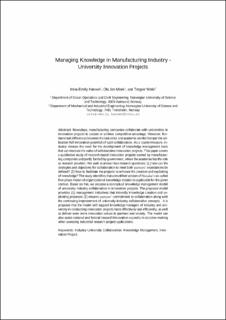| dc.contributor.author | Hansen, Irina-Emily | |
| dc.contributor.author | Mork, Ola Jon | |
| dc.contributor.author | Welo, Torgeir | |
| dc.date.accessioned | 2020-03-31T08:03:03Z | |
| dc.date.available | 2020-03-31T08:03:03Z | |
| dc.date.created | 2020-01-06T08:55:44Z | |
| dc.date.issued | 2019 | |
| dc.identifier.isbn | 978-3-030-29996-5 | |
| dc.identifier.uri | https://hdl.handle.net/11250/2649565 | |
| dc.description.abstract | Nowadays, manufacturing companies collaborate with universities in innovation projects to sustain or achieve competitive advantage. However, fundamental differences between the industrial and academic worlds hamper the utilization full innovation potential of such collaboration. As a countermeasure, industry stresses the need for the development of knowledge management tools that can increase the value of collaborative innovation projects. This paper covers a qualitative study of research-based innovation projects owned by manufacturing companies and partly funded by government, where the academia has the role as research provider. We seek to answer two research questions: (1) how can the strategies and objectives for collaboration to meet both partners’ expectations be defined? (2) how to facilitate the projects to enhance the creation and exploiting of knowledge? The study identifies that a modified version of Nonaka’s so-called five-phase model of organizational knowledge creation is applicable for the given context. Based on this, we propose a conceptual knowledge management model of university-industry collaboration in innovation projects. The proposed model provides (1) management initiatives that intensify knowledge creation and exploiting processes (2) ensures partners’ commitment to collaboration along with the continuing improvement of university-industry collaborative concepts. It is proposes that the model will support knowledge managers of industry and university in conducting innovation projects more effectively and efficiently, as well as deliver even more innovation values to partners and society. The model can also assist national and federal research/innovation councils in decision-making when assessing industrial research project applications. | en_US |
| dc.language.iso | eng | en_US |
| dc.publisher | Springer | en_US |
| dc.relation.ispartof | Advances in Production Management Systems. Towards Smart Production Management Systems : IFIP WG 5.7 International Conference, APMS 2019, Austin, TX, USA, September 1–5, 2019, Proceedings, Part II | |
| dc.title | Managing Knowledge in Manufacturing Industry - University Innovation Projects | en_US |
| dc.type | Chapter | en_US |
| dc.description.version | acceptedVersion | en_US |
| dc.source.pagenumber | 603-610 | en_US |
| dc.identifier.doi | 10.1007/978-3-030-29996-5_69 | |
| dc.identifier.cristin | 1766471 | |
| dc.description.localcode | This is a post-peer-review, pre-copyedit version of an article published by Springer. Locked until 24.8.2020 due to copyright restrictions. The final authenticated version is available online at: https://doi.org/10.1007/978-3-030-29996-5_69 | en_US |
| cristin.unitcode | 194,64,93,0 | |
| cristin.unitcode | 194,64,92,0 | |
| cristin.unitname | Institutt for havromsoperasjoner og byggteknikk | |
| cristin.unitname | Institutt for maskinteknikk og produksjon | |
| cristin.ispublished | true | |
| cristin.fulltext | original | |
| cristin.qualitycode | 1 | |
